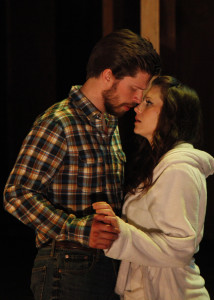Chance Theater matches ‘Passion Play’s passion
A firm grasp of this towering examination of suffering shows troupe’s taste for important work
by Eric Marchese
 Epic plays are monumental achievements that don’t come along too often. When they do, they’re reminders of how personal and intimate theater can be while still on a grand scale and universal in content.
Epic plays are monumental achievements that don’t come along too often. When they do, they’re reminders of how personal and intimate theater can be while still on a grand scale and universal in content.
To “Angels in America,” “Homebody/Kabul” and the two “Laramie Project” plays on the list of recent great epics, add Sarah Ruhl’s “Passion Play.”
It took Ruhl the better part of a decade to complete this trilogy, which sets the religious custom of the Passion Play against three decidedly different historical backdrops.
Trevor Biship’s Chance Theater staging, the show’s Orange County premiere, is up to the task, creating the kind of epic production that stuns upon first viewing and provokes thought and debate long afterward.
Each segment shows a small troupe of actors and their director striving to enact the Passion Play for their community – first in Elizabethan England circa 1575, then Germany in 1934 during the dawn of Nazism and, finally, in South Dakota in the post-Vietnam War era.
In chronicling the phenomenon of the Passion Play and its evolution through the centuries, Ruhl’s text brims with biblical and historical references. The play is also rife with fantastic and surreal occurrences and omens. Huge, phosphorescent fish float through the air. Queen Elizabeth I condemns all Passion Play productions during her reign, then reappears in South Dakota in battle fatigues and brandishing a gun.
Such touches offer clues to Ruhl’s thought processes. At its core, “Passion Play” depicts not only the suffering, or “passion,” endured by Christ leading up to his death, but the physical, emotional and spiritual pain felt by most of humanity down through the ages. Ruhl clearly recognizes that history is laden with conflict and often horrifying violence.
That sadly knowing sensibility permeates “Passion Play” and gives Biship’s staging electrifying jolts of reality. As each segment unfolds, characters are positioned all around us, using walkways – behind us on all three sections of Fred Kinney’s scenic design – to stand or walk upon.
While each actor plays essentially the same character each time around, the fascination is in the variations upon each as dictated by the pressures of their circumstances – the distinctive historical era and its attendant baggage.
Most compelling are the characters drawn by Ben Moroski and Casey Long, who play cousins, very close friends, and brothers, respectively in each segment. Moroski’s characters are always “cast” as Jesus in the Passion Play, and Long’s as Pontius Pilate, the man forced to sentence Jesus to crucifixion.
Moroski delivers the range of reactions by a man who must bear the cross of portraying the Christ: authentic purity and chastity as a handsome, humble fisherman named John in Act 1; the struggles of, and pressures endured by, a man who must live up to his father’s repute as the lead in his German town’s annual Passion Play (Act 2); and a mellow, college-educated hippie who in Act 3 sees the Black Hills Passion Play as nothing more than “community theater.”
Long answers with some of the most intense characterizations enacted in his lengthy career with Chance. In Act 1, his twisted body mirrors his pathological jealousy for his handsome cousin, and he identifies with his portrayal of the serpent who tempts Eve. His Act 2 German foot soldier is boldly self-assured to Moroski’s chaste, timid, selfless Eric.
Most disturbing is Long’s Act 3 persona, a Vietnam vet whose PTSD begins to spiral out of control, prompting self-loathing – and discord with his beautiful wife. Completing each segment’s romantic triangle is Camryn Zelinger, who delivers self-delusion (Act 1), impudence (Act 2) and vulnerability (Act 3) as the woman cast as each Passion Play’s Virgin Mary.
Each performer has his or her moment in the first-rate cast – Katelyn Schiller as the German Christ portrayer’s precise, fussy, ever-critical sister; Jackson Tobiska’s cold-blooded Nazi officer; Robert Foran’s Director, who exhibits saintly patience with his amateur cast in medieval England but is a bellowing blowhard in rural Germany.
Karen Webster’s versatility shines as Queen Elizabeth, Adolf Hitler and President Ronald Reagan, and while her portrayals are as much parodistic as factual, she’s spot-on looks-wise as the queen and demeanor-wise as Der Führer.
“Passion Play” is as ambitious, wide-ranging and deep as “Angels in America.” Ruhl is a deft, brilliant writer – never more so than here. Her clever, layered play ranges drastically in tone and her text brims with tension, humor, hard-hitting historical accuracy and heart-breaking reality.
Chance clearly hungers to produce epic works of social import. Its impressive realization of Ruhl’s vision should more than satisfy anyone with a similar appetite.
Leave a Reply
